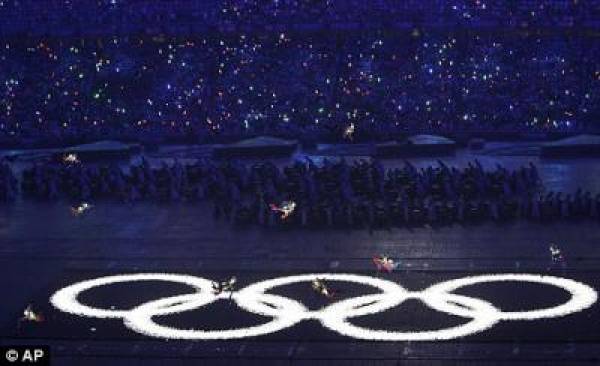2008 Summer Olympics Opening Ceremony in Beijing Magnificent

BEIJING - Once-reclusive China commandeered the world stage Friday, celebrating its first-time role as Olympic host with a stunning display of pageantry and pyrotechnics to open a Summer Games unrivaled for its mix of problems and promise.
Now ascendant as a global power, China welcomed scores of world leaders to an opening ceremony watched by 91,000 people at the eye-catching National Stadium and a potential audience of 4 billion worldwide. It was depicted as the largest, costliest extravaganza in Olympic history, bookended by barrages of some 30,000 fireworks.
It ended in spectacular fashion, when China's first Olympic superstar, 1984 six-time gymnastics gold medalist Li Ning, was hoisted by wires to the top of the stadium, circled the circumference as though he was spacewalking, then used his torch to send a torrent of flame spiraling upward to light the Olympic flame in a huge cauldron overlooking Beijing.
That was preceded by the parade of athletes, climaxing with the entry of the 639-strong Chinese team; It was led by flag-bearer and basketball idol Yao Ming alongside a 9-year-old schoolboy who survived May's devastating earthquake in Sichuan province.
The welcome - by a frenzied, chanting, flag-waving crowd that sought to cool itself with paper fans in the stifling heat - was thunderous. And moments later, the crowd erupted again when President Hu Jintao declared the games formally open.
President George W. Bush and Russian Prime Minister Vladimir Putin were among the glittering roster of notables who watched China make this bold declaration that it had arrived. Bush, rebuked by China after he raised human-rights concerns this week, is the first U.S. president to attend an Olympics on foreign soil.
Already an economic juggernaut, China is given a good chance of overtaking the U.S. atop the gold-medal standings with its legions of athletes trained intensely since childhood. One dramatic showdown will be in women's gymnastics, where the U.S. and Chinese teams are co-favorites; in the pool, Chinese divers and U.S. swimmers are expected to dominate.
The run-up to the games had epic story lines - China investing $40 billion (euro26 billion) to build the needed infrastructure, reeling from the catastrophic earthquake in May, struggling right up to Friday to diminish Beijing's stubborn smog. China's detentions of political activists, its crackdown on uprisings in Tibet and its economic ties to Sudan - home of the war-torn Darfur region - fueled relentless criticisms from human rights groups and calls for an Olympic boycott.
Second-guessed for awarding the games to Beijing, the International Olympic Committee stood firmly by its decision. It was time, the committee said, to bring the games to the homeland of 1.3 billion people, a fifth of humanity.
"For a long time, China has dreamed of opening its doors and inviting the world's athletes to Beijing for the Olympic Games," IOC President Jacques Rogge said in his speech. "Tonight, that dream comes true."
Rogge mentioned the Sichuan earthquake, saying the world was moved "by the great courage and solidarity of the Chinese people." And he exhorted the assembled athletes, as role models for the world's youth, to "reject doping and cheating."
The story presented in Friday's pageantry sought to distill 5,000 years of Chinese history - featuring everything from the Great Wall to opera puppets to astronauts, and highlighting achievements in art, music and science. Roughly 15,000 people were in the cast, all under the direction of Zhang Yimou, whose early films often often ran afoul of government censors for their blunt portrayals of China's problems.
He produced some majestic and ethereal imagery - at one point a huge, translucent globe emerged from the stadium floor, and acrobats floated magically around it to the accompaniment of the games' theme song, "One World, One Dream."
The show's script steered clear of modern politics - there were no references to Chairman Mao and the class struggle, nor to the more recent conflicts and controversies. The ceremony was taped for broadcast 12 hours later in the United States.
A record 204 delegations paraded their athletes through the stadium - superstars such as tennis great Roger Federer and basketball's Kobe Bryant, as well as plucky underdogs from Iraq, Afghanistan and other embattled lands. The nations were marching not in the traditional alphabetical order but in a sequence based on the number of strokes it takes to write their names in Chinese. The exceptions were Greece, birthplace of the Olympics, which was given its traditional place at the start, and the Chinese team, which lined up last.
Athletes from Japan, an old foe and current economic rival of China, were greeted coolly by the crowd even though they waved tiny Chinese flags. But cheers erupted for the next delegation, Taiwan, which China considers a breakaway province that should reunite with the mainland.
The U.S. team - second-largest after China's with nearly 600 members - was welcomed loudly, with many in crowd recognizing the basketball stars who brought up the rear. Bush rose from his VIP seat to wave at the athletes, nattily dressed in white trousers, blue blazers, red-white-and-blue-striped ties and white caps.
The American flag-bearer was 1500-meter runner Lopez Lomong, one of the Lost Boys of Sudan, who spent a decade of his youth in a refugee camp in Kenya. He's a member of the Team Darfur coalition, representing athletes opposed to China's support for Sudan. On Friday he avoided any criticism and said the Chinese "have been great putting all these things together."
Abroad, human rights activists were less generous.
"The Chinese government and the International Olympic Committee have wasted a historic opportunity to use the Beijing Games to make real progress on human rights in China," said Sophie Richardson of Human Rights Watch.
For Chinese dissidents who have dared to challenge the Communist Party's monopoly on power, the start of the Olympics meant tighter surveillance and restrictions.
"It's not my Olympic Games," said Jiang Tianyong, a human rights lawyer. "It's not the games for the ordinary people."
By all indications, however, most Chinese have embraced the games, buying up tickets at a record pace, volunteering by the thousands for Olympic duties, nursing expectations of triumphs by their home team.
To their eyes, the omens were good. The ceremony began at 8 p.m. on the eighth day of the eighth month of 2008 - auspicious in a country where eight is the luckiest number.
"It not easy to meet with such a date," said Wang Wei, secretary general of Beijing Organizing Committee. "Hopefully this lucky day will bring luck."
Want to bet on the Beijing Summer Olympics Online? Go Here Now













